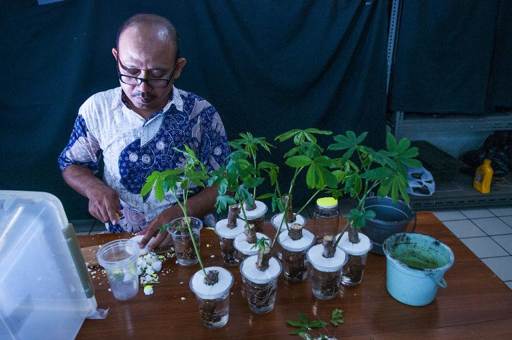An "eco-friendly SWAT team" of 2,000 tiny wasps was released in Indonesia Wednesday to battle bugs threatening to devour cassava crops, a major staple and source of income for millions.
The two-millimetre A. Lopezi parasitic wasps work by laying larvae that consume the mealybugs from the inside and mummify them. The wasps must eat the pest to survive.
The cassava pink mealybug is native to South America, as is cassava, and is one of the most destructive pests to prey on the crop, according to the team of scientists behind the wasp release.
It likely travelled to Africa and Asia by hitchhiking on infected cassava as it was transported across countries and continents.
Scientists behind the release, from the Colombia-based International Center for Tropical Agriculture (CIAT), Indonesia's Bogor Agricultural University and the UN's Food and Agriculture Organisation, have dubbed the wasps an "eco-friendly SWAT team" and stress they are harmless to humans and animals.
The mealybugs "have been living in the lap of luxury" in their new environments, where they face no effective threats, according to Kris Wyckhuys, an entomologist from CIAT focusing on Asia. "It’s time to help nature along."
The wasps, which are native to Central America, were released in a confined field covered by a large cage on the outskirts of Jakarta on Wednesday afternoon, which will allow them to reproduce naturally and be monitored in local conditions before being unleashed in an open field.
Indonesia is one of the world’s biggest cassava producers and each year plants some one million hectares (2.5 million acres) of the crop. It is the second most-consumed staple after rice in the developing nation of 250 million people, which struggles with malnutrition.
It is consumed as a vegetable but also processed into starch to make a variety of products from noodles to pharmaceuticals.
The mealybugs are capable of reducing cassava yields by up to 84 percent. Among Asian countries, they were first reported as a major problem in Thailand in 2008.
The pest has also been detected in other Asian nations including Cambodia, Laos and Vietnam.
Although the current area affected in Indonesia is still low, the scientists said the pest can spread fast if not managed, as Thailand found. Wasps were successfully used there to tackle the problem.
"If we don't act now, this could be a major blow to the country's cassava industry and to the millions of farmers who depend on this crop for their incomes," said Aunu Rauf, an entomologist with Bogor Agricultural University.
A massive aerial wasp drop in the 1980s in sub-Saharan Africa was credited with saving the cassava industry from $20 billion in potential damages.






















































